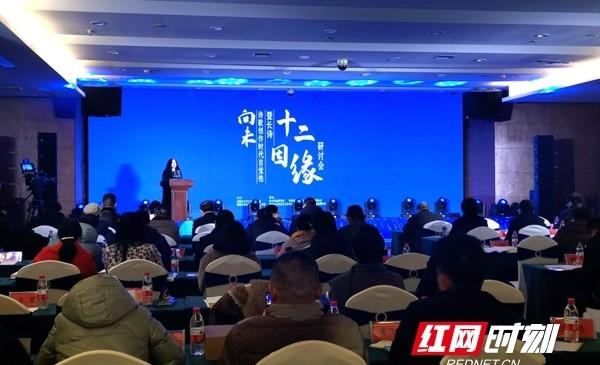
Seminar site.
The poet introduces the work to the unseasoned.
Live show performances.
Red Net Moment Changde January 8 (Reporter Huang Gang) Because of a work, big coffee gathered. On the morning of January 8th, the seminar on the self-consciousness of the era of unsophistication and the long poem "Twelve Causes and Conditions" was held on the shore of Changde Liuye Lake.
The seminar was sponsored by changde federation of literary and art circles, the school of literature, history and law of Hunan University of Arts and Sciences, and co-organized by the School of Literature, History and Law of Hunan University of Arts and Sciences to the Research Office of Unfinished Works, Changde Writers Association, Changde Poetry Association, Changde Recitation and Speech Association, and Changde Liaison Office of Hunan Popular Language Art Research Association.
At the meeting, Yang Ke, member of the presidium of the Chinese Writers Association and president of the Chinese Poetry Society, Zhang Haiqing, secretary of the party group of the Changde Municipal Federation of Literature and Literature, and Wang Chong, general secretary of the party branch of the School of Literature, History and Law of Hunan University of Arts and Sciences, delivered speeches on the spot.
At the seminar site, literary celebrities from all over the country shared their own eyes on "Twelve Causes and Conditions". Cao Shu, a visiting professor at Hunan Normal University and vice president of the Hunan Poetry Society, believes that "Twelve Causes and Conditions" is an epiphany poem of Eastern wisdom, which is completely different from the speculative works of Western modernism, which refers to and approaches the essence of language in the way of meditation, and gathers the voices of the world with a lifetime of listening. The narrative of personal history and family history in the poem, the writing of family and country feelings and the traceability of cultural and blood relations are the refraction of the times and history, but also the divine sparkle of personal feelings, and the deep elegy of time, life and civilization.
Yan Zhen, vice chairman of the Hunan Provincial Writers Association, professor of Central South University, and doctoral supervisor, said that when I read this long poem, I was constantly touched by those wonderful verses, and my heart was like a torrent of obstacles. In The Twelve Causes and Conditions, I read about the exuberant passions of life, the subtle experiences of life, and the heavy pain of life. I personally do not have a deep karma with Buddhism, but this does not prevent me from understanding, appreciating, and blending with the long poem "Twelve Causes and Conditions." In the process of reading, I will always feel that my emotions and thoughts are slowly rising and floating, entering a higher state of life.
The honorary chairman of the Hunan Provincial Writers Association and the president of the Hunan Provincial Essay Literature Association believes that the twelve links of "Twelve Causes and Conditions" from ignorance to old age and death are the twelve links of life in the Buddha's teachings, and these links are closely interlinked and mutually causal. The beauty of the poet is that he closely links the self, society, the world, history, and the present, to explain the Buddha's teachings, and to explain some common phenomena in life and nature to explain the profound truths of the Dharma.
Zhou Bihua, a third-level researcher of the Changde Municipal Federation of Literature and Literature, said that to taste Xiang Wei's "Twelve Causes and Conditions", it is necessary to achieve the harmony of perception and state of mind, his poems are pure, the language is clean, and the state of mind of reading poems also needs to be clean. In the process of "explaining", the poet presents us with a real world, because in the face of such a great poem constructed by Buddhism, the reader's heart must be quiet. Fortunately, he had a clean language and built me a convenient bridge.
Xiang Wei, real name Xiang Yanbing, Tujia family, a native of Shimen County, Hunan, a member of the Plenary Committee of the Hunan Provincial Writers Association, vice president of the Hunan Poetry Society, and chairman of the Changde Poetry Association. Poetry and novels and other works have been published in domestic and foreign publications such as "National Literature", "Poetry Journal", "Stars", "Hibiscus", "People's Literature", "Reader" and other domestic and foreign publications, contributing to the prosperity of ethnic minority literature. He has won the 29th Hunan Youth Literature Award, the first prize of the Ding Ling Literature Award and other awards. The TV series "A Hundred Years of Virtual Clouds" adapted from its original book was broadcast on CCTV 4 and 8 sets.